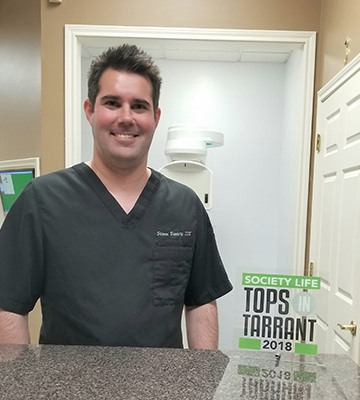Dry Mouth Treatment – Colleyville, TX
Get Rid of that Desert in Your Mouth
Dry Mouth, or Xerostomia, is a condition that occurs when your body doesn’t produce enough saliva. It can be uncomfortable and bothersome, but more importantly, it can impact your oral health. Individuals with dry mouth are three times more likely to get cavities, gum disease, tooth infections and oral fungal infections than someone with normal salivary flow. Dry mouth affects 1 in 4 adults.
Why Choose DFW Dental Implant Center for Dry Mouth Treatment?
- Effective, noninvasive solutions
- Proven to dramatically lower the risk of tooth decay & gum disease
- Friendly, kind, & and highly-experienced team
How Do You Know If You Have Dry Mouth?

If you answer “Yes” to any one of the questions below, please call our dental office at (817) 518-9958 to schedule an appointment:
- Do you take more than 2 medications daily?
- Does your mouth usually feel dry?
- Do you regularly eat or drink to keep your mouth moist?
- Do you get thirsty at night and get out of bed to drink fluids?
- Does your mouth usually become drier when you speak?
- Do you carry a bottle of water with when you leave the house?
What are the Causes of Dry Mouth?

Medications are the number one cause of dry mouth. More than 500 medications, including over-the-counter and commonly prescribed medications, can cause dry mouth. One study found that taking multiple medications may increase your risk of Dry Mouth by 40%.
OTC and Prescription Medications
- Anti-depressants
- Decongestants
- Anti-histamines
- Muscle Relaxants
- Anti-hypertensives (for high blood pressure)
- Beta-blockers
- Diuretics
- Appetite Suppressants
Medical Conditions and Diseases
- Chemotherapy
- Radiation Cancer Treatments
- Overactive Bladder
- Sjögren’s Syndrome
- Scleroderma
- Diabetes
- Parkinson’s Disease
What are the Symptoms of Dry Mouth?

Dry Mouth symptoms can vary from person to person. Common symptoms may include:
- Dryness in the mouth
- Difficulty swallowing or eating dry foods
- Problems wearing dentures
- Problems speaking
- A sticky feeling in the mouth
- Bad breath
- Chapped lips
- Waking up at night feeling thirsty
Why is Saliva Important?

Saliva does more than just keep your mouth moist. It plays an important role in your overall oral health because of it:
- Moisturizes and lubricates the mouth and prevents dehydration
- Protects your teeth from decay by providing high levels of calcium, fluoride and phosphate ions.
- Keeps bacteria in your mouth under control and can prevent infections and bad breath
- Aids digestion and taste
- Assists in speaking and swallowing
- Maintains oral pH balance in your mouth
- Cleans and washes away food from your teeth and gums
- Helps protect the soft tissues in your mouth
Why Choose The DFW Dental Implant Center For Dry Mouth Treatment?

Over the past decade, Dr. Branberg has seen an increasing number of patients presenting with Dry Mouth. These patients are at high risk for root surface cavities, gingivitis, tooth infections, cracked lips, and more. Depending on the severity of dry mouth symptoms, rampant tooth decay can occur in as little time as 2 to 3 years’ time. Early diagnoses and prevention are two of the most important factors to protect the teeth. By researching various treatment modalities and products available, he has established a Dry Mouth Protocol to help people suffering from dry mouth keep their teeth.
Recommended Dry Mouth Protocol

- Visit The DFW Dental Implant Center for Routine Dental Exams and Teeth Cleanings – We recommend visiting The DFW Dental Implant Center every 3 months for a dental exam, cleaning, and topical fluoride varnish application. Fluoride is important because it can strengthen exposed root surfaces and can help remineralize the enamel so the teeth are less prone to decay.
- Practice Good Oral Hygiene – Brush your teeth with a toothpaste high in fluoride, such as Prevident 5000 Toothpaste, Biotène® Fluoride Tooth, or Sensodyne Toothpaste for Sensitive teeth, at least three times per day. Make sure to floss at least once per day and use an alcohol-free mouth rinse, such as Listerine or Biotène® Dry Mouth Oral Rinse at least once per day. Be sure to avoid mouth rinses with alcohol because these will dry your mouth out.
- Drink Plenty of Water – Water helps keep you hydrated and can temporarily relieve the dry feeling in your mouth. A simple way to know how much water to consume each day is using the following formula:
# of Ounces of Water to Drink Per Day = Weight (in lbs.) divided by 2
- Chew Sugarless Gum with Xylitol or Suck on Sugarless Lozenges with Xylitol – Xylitol is a sugar alcohol that has been found to kill the bacteria in your mouth that causes tooth decay. They will also stimulate your mouth to create saliva, which will prevent dry mouth.
- Try Over-the-Counter (OTC) Products – We recommend rinsing with 1 tablespoon of Biotène® Dry Mouth Oral Rinse for 30 seconds in the morning, using Biotène® Moisturizing Spray after lunch, and placing ½ inch of Biotène® Oralbalance Moisturizing Gel on your tongue and spreading it around before going to bed for overnight symptom relief. Unlike water alone, Biotène® products contain glycerol, which binds with water to help lubricate and coat the soft tissues of your mouth for up to 4 hours.
